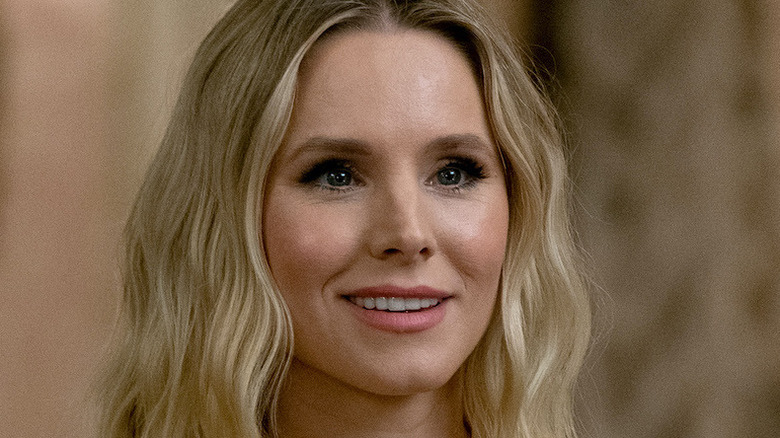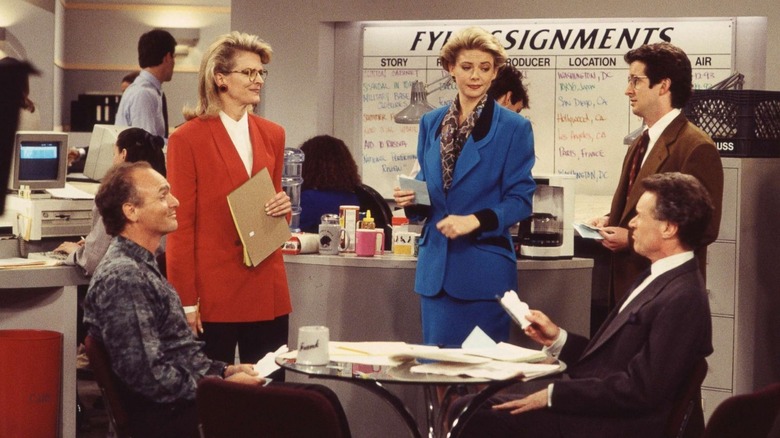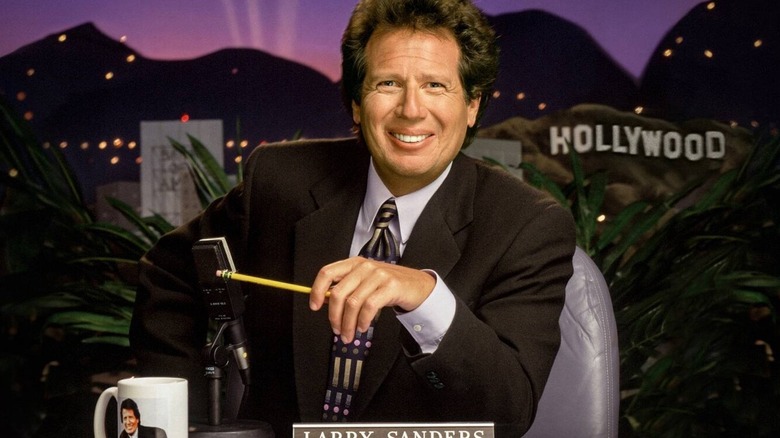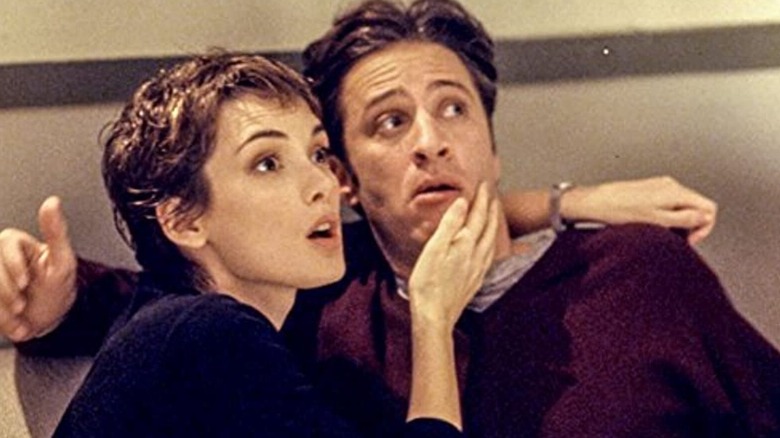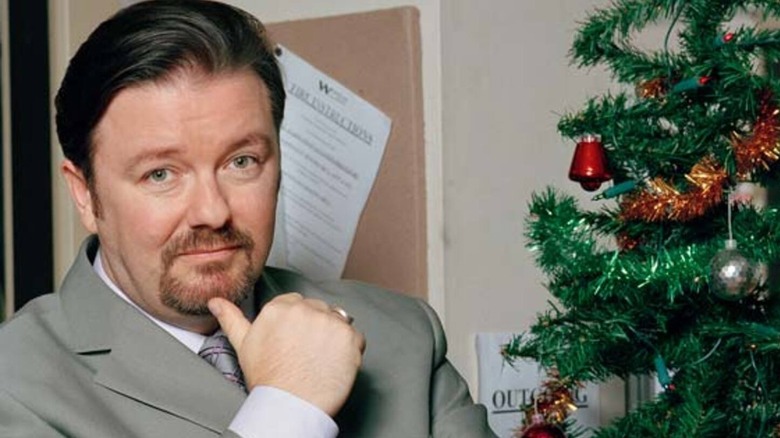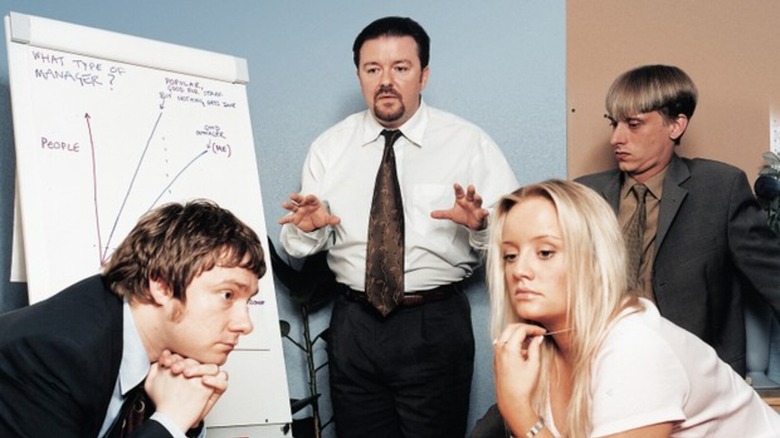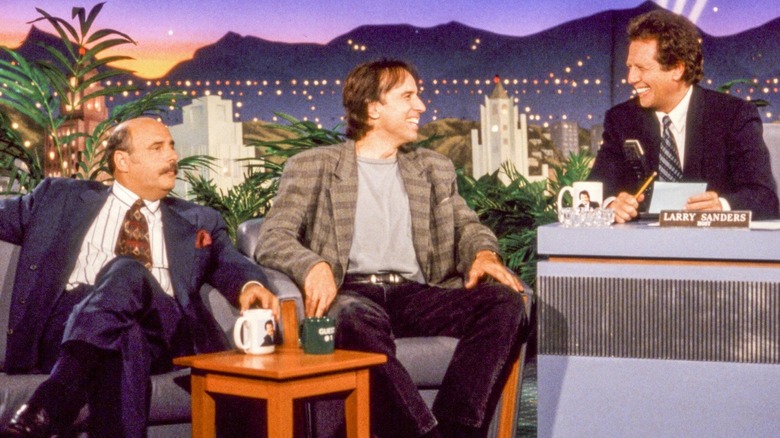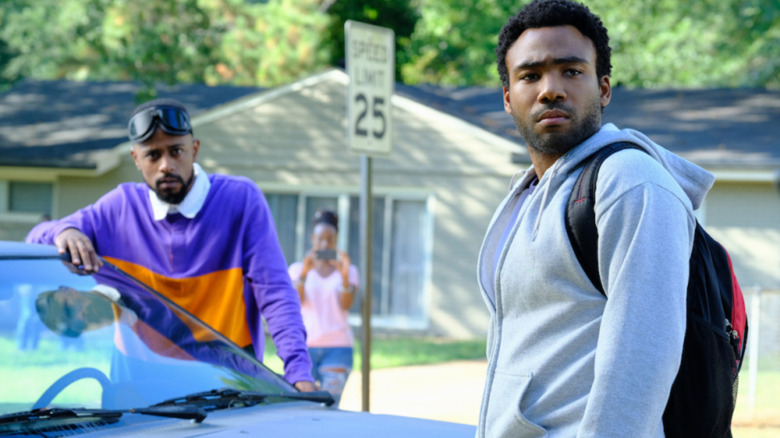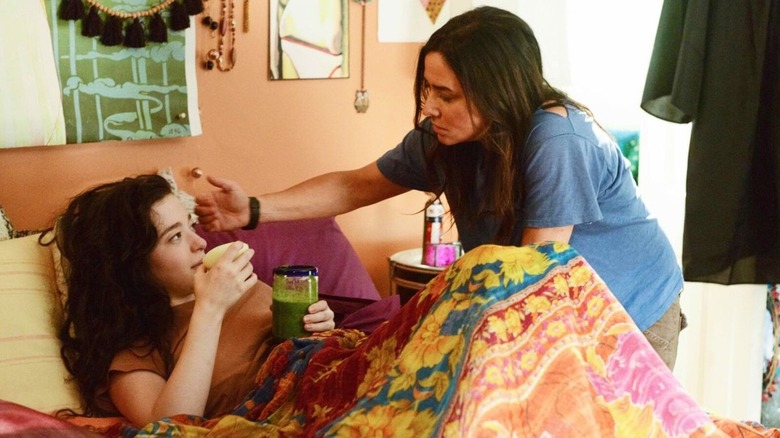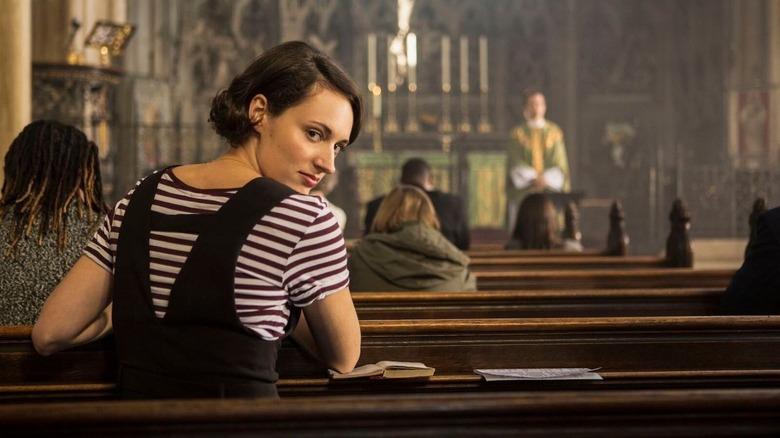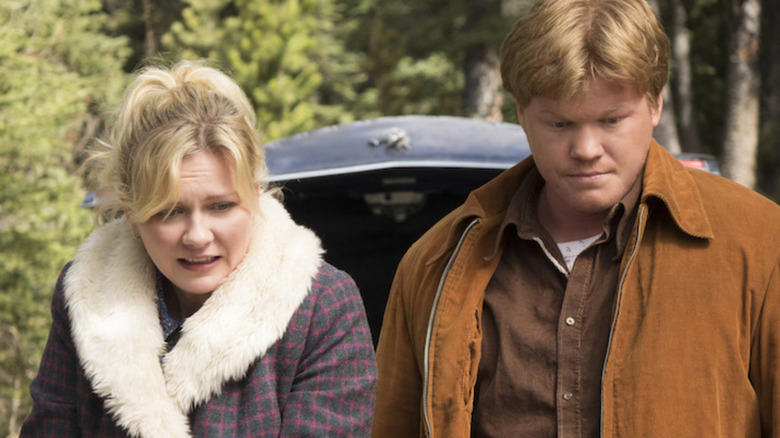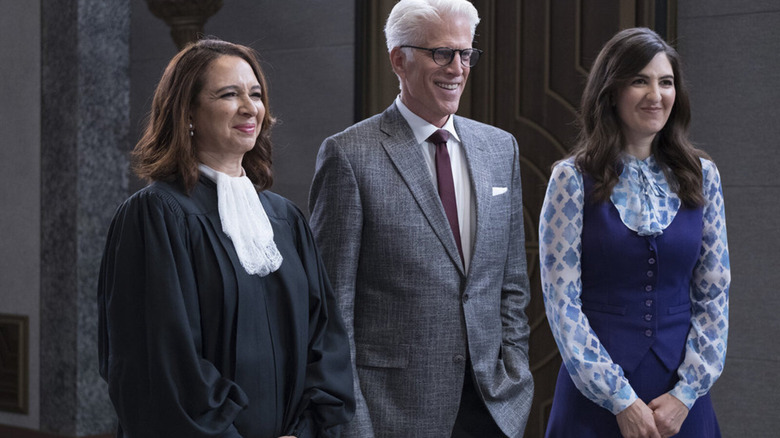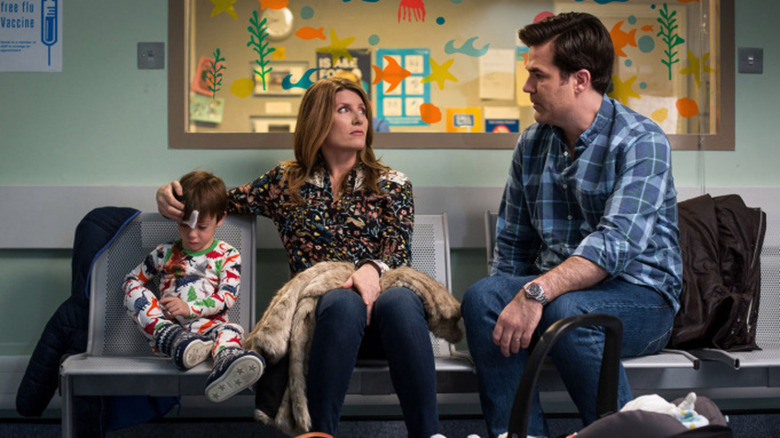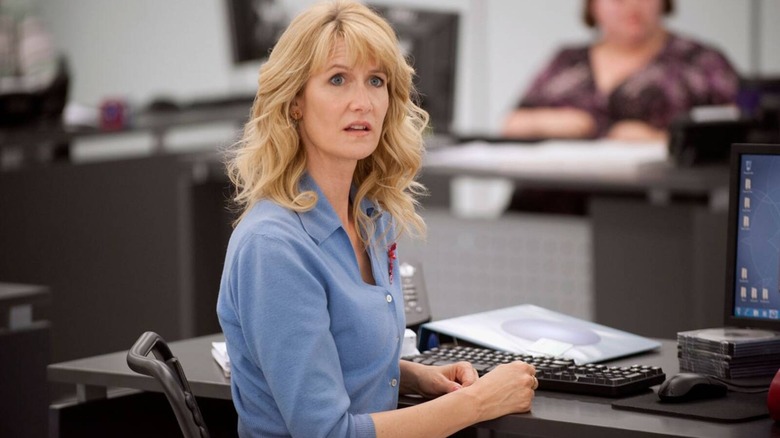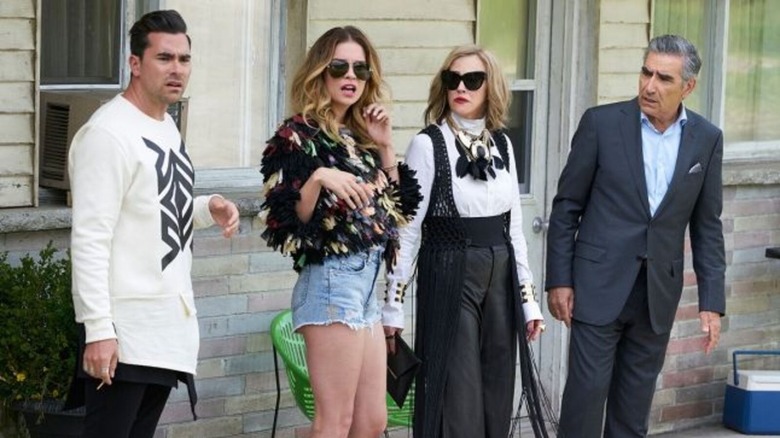The Only 14 Near-Perfect Sitcom Seasons Of All Time According To Metacritic
Sitcoms, or "situation comedies", as the cool kids say it, have been a part of pop culture ever since the start of television. From "I Love Lucy" to "M.A.S.H" to "Friends" to "Modern Family," the form and style of the traditional sitcom has seen many changes over the years. As the tastes of audiences have changed, so have the styles of the sitcoms that manage to capture the attention of the masses in each new decade.
It is difficult to pin down any hard and fast rules that make a sitcom successful. Most of the time, the success boils down to an almost serendipitous combination of the right cast, writing and collection of relevant themes that the sitcom is built around. As such, it is difficult to point to any one sitcom as being the best of all time, since it can be difficult to maintain a high standard of excellence across multiple seasons of a show.
However, in rare cases, certain seasons of certain sitcoms manage to rise above the rest to become a close-to-perfect representation of that show's best traits. Thanks to review aggregate sites like Metacritic, you can easily discover the best seasons of a particular show. Here are 14 such seasons of popular sitcoms that carry a near-perfect score on Metacritic.
Murphy Brown -- Season 2
News shows and the world of investigative journalism has always proven ripe grounds for comedy. "Murphy Brown" was one of the earliest and most successful sitcoms to mine that world for its humor potential. Candice Bergen stars as the titular Murphy Brown, a tough but fair host of the TV newsmagazine "FYI," taking on the challenges of the media landscape with a collection of quirky characters and dealing with some tough situations in order to bring the truth to her audience.
The second season of "Murphy Brown," which has a Metacritic score of 100, saw the show's cast and writing find its groove and begin firing on all cylinders. The relationships between Murphy, Corky (Faith Ford), Jim Dial (Charles Kimbrough) and Eldin Bernecky (Robert Pastorelli) were solidified, while an eclectic cast of guest stars that included Teri Hatcher, Connie Chung and Mayim Bialik kept the episodic arcs rolling at a brisk pace.
Particular praise was afforded to Episode 4, "TV or Not TV," in which an actress, played by Morgan Fairchild, comes to "FYI" to shadow Murphy as prep work for her next role. Entertainment Weekly's television critic Ken Tucker commented, "The brilliant episode in which Morgan Fairchild played an actress researching her role for a TV sitcom just like 'Murphy Brown' was the best-written half-hour of any show of the season."
The Larry Sanders Show -- Season 4
"The Larry Sanders Show" might have receded into the pop culture background, but its influence continues to be felt to this day. Its successors include "Curb Your Enthusiasm," "30 Rock" and "The Office." Garry Shandling stars as the titular Larry Sanders, host of a fictional late-night talk show where the biggest celebs of the day come to promote their projects.
Much like on "30 Rock," the famous guest stars that appeared on "The Larry Sanders Show" played fictional, exaggerated versions of themselves. This included a recurring bit where "The X-Files" star David Duchovny professes his crush on Larry, a misguided segment in which a wardrobe malfunction puts Carol Burnett face to face with Larry's nether regions, and the time when Gene Siskel and John Ritter have a physical altercation over the film critic's review of "Skin Deep."
Every season of "The Larry Sanders Show" is considered comedy gold, but Season 4, with a Metacritic score of 99, is considered particularly emblematic of the sitcom's brilliant writing. This was the season which earned the show its first Emmy, with Rip Torn coming out a winner in the Outstanding Supporting Actor in a Comedy Series category. The season was nominated for a further 12 Emmys, and the accolades would continue to be lavished on the show with later seasons, including three Primetime Emmy Awards and a BAFTA.
The Larry Sanders Show -- Season 6
The sixth and final season of "The Larry Sanders Show" was pre-decided to be the last one. As such, the season was built towards a natural conclusion, beginning as early as the second episode, aptly titled "The Beginning of the End." A new network executive enters the picture with lots of fresh ideas to take Larry's talk show to the next level, none of which incite much enthusiasm in Larry.
The season, which has a Metacritic score of 99, retained much of the same madcap energy that had made the early seasons so memorable, while also moving things in new directions for Larry, his sidekick Hank Kingsley, their producer Artie, and the rest of the main cast. Particularly memorable was the hour-long series finale, which featured guest appearances by Jim Carrey, Jerry Seinfeld, Tim Allen, Ellen DeGeneres, Carol Burnett, Sean Penn, Clint Black and others.
Critics felt that the show managed to be as good as it had ever been going into its final batch of episodes, with Tim Goodman commenting for the San Francisco Chronicle, "Now in its last season, 'The Larry Sanders Show' is the funniest non-animated show on television, period."
The Office U.K. -- Christmas Specials
For younger fans of the U.S. version of "The Office," the show is so uniquely American that it can be surprising to discover that it is actually a remake of a British show starring Ricky Gervais and Martin Freeman. The American version of the mockumentary sitcom managed to set itself apart quite distinctly from the British one, which means fans could watch both shows and expect to get something new from each.
After a successful first two seasons of the U.K.'s "The Office," two additional episodes, 45 and 50 minutes in duration, were released, titled "Christmas Special: Part 1 and 2." The two specials, with a Metacritic score of 98, take the form of "revisited" documentaries, popular in Britain, in which the stars of the earlier two seasons — who have now become famous — catch up with a documentary crew once again to show how their lives have changed since we first encountered them.
The specials were praised for keeping to the spirit of the previous episodes, while furthering the story of the main cast of characters in hilarious yet meaningful ways. Alessandra Stanley wrote in The New York Times that the specials are "as wickedly, painfully funny as the first two seasons and, in tiny, fleeting doses, as delicately tender."
The Office U.K. -- Season 1
The U.K's "The Office" was created, written and directed by Ricky Gervais and Stephen Merchant. The show took a satirical look at the everyday functions of the office employees in the Slough branch of a paper company. Gervais played the lead role of General Manager David Brent, whose condescending, conceited approach to management leads to much of the central tension of the series.
Season 1 of the show did not garner a lot of interest at first. But upon its international airing, the season, which has a Metacritic score of 98, quickly became a runaway hit. That led to a second season being greenlit and inspired a number of remakes in other countries, the most famous of those, of course, being the U.S. version starring Steve Carell.
It is in this first season that we get to meet the characters that have come to define "The Office" archetypes, from Brent, the overbearing head of the office, to slacker employee Tim who likes to play pranks, to the quiet receptionist Dawn, to the obsessive and neurotic office bully Gareth. The cutting nature of the jokes might throw some viewers who are used to the more mild comedic stylings of its U.S. counterpart off, but that is what gives the show its own identity in a sea of remakes. As Noel Murray from The AV Club opined, "It's an unrefined, savage dissection of ego, power, and salaryman desperation, populated by at least three peerless comic creations."
The Larry Sanders Show -- Season 5
We're back with "The Larry Sanders Show" for Season 5, and by now the series had a very clear grasp of what it was about, and what it needed to keep moving forward. The first episode sees Larry dealing with the prospect of being replaced as the host of his show by a young, upstart host, Jon Stewart. Things only go downhill from there for Larry and his cronies as they struggle to maintain control over their kingdom.
Faced with a slump in ratings, Larry, Artie and Hank are driven to increasingly desperate means to retain relevance, hatching schemes which include a very public war of words with a critic who writes scathingly about their show, and a botched attempt to get People magazine to cover a visit to the set from Make-a-Wish child Charlie.
"The Larry Sanders Show" seemed to take great glee in not pulling any punches in its fifth season, earning it a Metacritic rating of 97. The show continued to cast a new light on the ins and outs of show business. John Carman praised the season's perspicacity in the San Francisco Chronicle, commenting, "As always, the beauty of 'The Larry Sanders Show' is that it delivers its comedy with only the slightest fanciful tweak to Hollywood's offscreen reality."
Atlanta -- Season 2
If you only know Donald Glover through his music persona Childish Gambino, the show "Atlanta," which he created, is a great primer on his talents as a writer and actor. The series follows Glover's character Earn, as he struggles to turn his life around after discovering that his cousin Alfred, played by Brian Tyree Henry, is on the verge of stardom as the rapper Paper Boi.
Earn's plan is to manage Alfred and get a piece of his earnings. Alfred, on the other hand, sees Earn as a leech, and struggles with depression and his new found fame. The unlikely duo encounter a range of characters and situations that cast a light on the Atlanta rap scene, as well as social issues relating to racism, homophobia, drug abuse and more.
Season 2 of the show, with a Metacritic score of 97, is more episodic in nature, instead of telling one interconnected story over several episodes. This allows the writing to cover even more subjects across a more diverse and unexpected range, ending with a memorable season finale. "The most striking thing about 'Atlanta' is how it surprises you," noted Joanna Hunkin for the New Zealand Herald. "An episode about absolutely nothing can speak volumes and in a split second, you can go from laughing out loud to stunned silence."
Better Things -- Season 2
There are stories aplenty about fresh-faced hopefuls coming to L.A. in search of stardom. "Better Things" ups the ante by focusing on Sam Fox, a struggling actress who also happens to be a single mother raising three young daughters in L.A.
The second season of the show, with a Metacritic rating of 96, plays to its strengths by focusing on the main characters that audiences know and love from the first season and showing their evolution. Sam feels that her daughters do not appreciate all she does for them, while also learning that her oldest daughter Max (Mikey Madison) is in a relationship with a much older man.
To add to her woes, Sam has to fend off the attentions of a deadbeat friend while struggling to keep on good terms with her ex-husband Xander. The sophomore season of "Better Things" was considered to take more risks with its narrative than the first season, while also managing to pack in plenty of humor. Sophie Gilbert from The Atlantic commented, "Dreamier and more wistful in style but with the same caustic sense of humor, the show takes more risks with structure and technique."
Fleabag -- Season 2
If you have used the Internet for meme-related purposes even occasionally in the past few years, chances are you have seen at least a passing mention of the British tragicomedy television series "Fleabag" — and with good reason. Based on Phoebe Waller-Bridge's one-woman show that she first performed in 2013, "Fleabag" is one of the best written shows of the past decade. Season 2, with a Metacritic rating of 96, features some of the sharpest material that its writers have ever come up with.
"Fleabag" tells the story of a sexually free but emotionally fragile young woman in London, played by Waller-Bridge. Despite being billed as a comedy, "Fleabag" is as much a heartfelt study of individual tragedy as it is a scathingly funny indictment of a society that judges and punishes female autonomy at every turn, with critic Allison Shoemaker describing Season 2 as a "portrait of grief, fear, and love that's startling, painful, achingly funny, unbearably sexy, pretty much perfect, and somehow better than the first season."
Although short-lived, "Fleabag" is credited with revolutionizing women-centric stories in entertainment, apart from making a star out of Waller-Bridge. That led to the actress hosting "Saturday Night Live" and even becoming a part of the "Star Wars" universe.
Fargo -- Season 2
Showrunner Noah Hawley's "Fargo" series has cemented a unique position in pop culture. Each season of the show follows an anthology format, and each new season takes place in a different era and location, with a fresh cast of characters and social themes. Much like the 1996 Coen Brothers film of the same name that inspired the show's creation, each season of "Fargo" offers somewhat cynical and absurdist commentary on different types of small town milieu.
Season 2, which has a Metacritic rating of 96, takes place in 1979. Minnesota natives Peggy (Kirsten Dunst) and Ed Blumquist (Jesse Plemons) need to cover up a criminal act committed by Peggy that resulted in the murder of Rye Gerhardt (Kieran Culkin), heir to the Gerhardt crime family in Fargo, North Dakota. At the same time, State Trooper Lou Solverson (Patrick Wilson) takes the help of his father-in-law, Sheriff Hank Larsson (Ted Danson), while investigating a triple homicide at a local diner with connections to Rye.
Much like the first season, the second season of "Fargo" was praised for skillfully weaving a web of dark intrigue around the seemingly drab lives of small town folk, with Tom Long reporting for The Detroit News, "Fargo revels in presenting ordinary folk with extraordinary problems, in stripping away their everyday guises and peering long and hard at their dark potential."
The Good Place -- Season 3
There has never been a show that combines sitcom humor and a deep engagement with world philosophy the way "The Good Place" managed to do season after season. The premise of the show was simple: A woman named Eleanor finds out she has died and accidentally got sent to heaven despite her past sins. Now, Eleanor must learn to become a better person if she wants to remain in heaven, referred to as the "good place."
Season 3 of the show, with a Metacritic rating of 96, brings the human cast of characters back to life, as they are given a second chance at becoming morally good under the tutelage of the angel Michael. Once again, in their struggle to become good people in the face of sinful temptation, the group has to ask some hard-hitting questions about what it truly means to be good and unselfish.
The season was praised for continuing to explore the central theme of the series regarding the nature of good and bad, while also expanding the show's mythology with a detour to the Earthly plane before the game-changing end of the series. Steve Greene for IndieWire commented, "Watching the show work the other way, bringing a bit of that surreal magic to the constraints of Earth, is a delightful reversal."
Catastrophe -- Season 3
"Catastrophe" follows the story of Irish primary school teacher Sharon, whose life is turned upside down when she has a week-long fling wth Rob, an advertising executive from the U.S. who comes to London on a business trip. After Rob returns to Boston, Sharon discovers she is pregnant.
This prompts Rob to move to London to be with her, and they become a family, getting married and having a son and a daughter. The third season of "Catastrophe" sees Sharon and Rob's relationship under strain as financial obligations and professional hardships become the new bane of their existence.
Much darker and foul-mouthed than most American sitcoms centering around relationships, "Catastrophe" wears its dysfunction like a badge of honor. The third season of the show, with a Metacritic rating of 96, kicks things up several notches higher in terms of the suffering that Rob and Sharon have to undergo to make their relationship work. Lauren Carroll Harris opined for The Guardian about the show, "With its perverse insights into relationships, delusion and self-destructiveness, 'Catastrophe' gets both funnier and grimmer with each season."
Enlightened -- Season 2
One of the most disappointing cases of a niche show with a passionate fanbase that nevertheless could not survive the ratings competition, "Enlightened" was canceled after two seasons. But it continues to draw praise for what it was able to achieve in its relatively brief run. The show follows Amy Jellicoe (Laura Dern), a naïve but ambitious buyer at Abaddon Industries. Despite a successful career, Amy's self-destructive ways catch up with her, and she finds herself attending rehab after a very public nervous breakdown at the workplace. She returns to her former company with a changed attitude, and a desire to be an agent for positive change in the world.
Season 2 of "Enlightened," with a Metacritic rating of 95, finds Amy going a step further with her new, positive mantra, to the extent that she wants to expose Abaddon's corrupt business practices. But Amy's personal relationships within and outside the company get in the way of her whistleblowing efforts. Maureen Ryan from HuffPost felt the show was essential viewing, declaring, "The show's must-see second season is one of the best stories I've experienced in a long time."
Schitt's Creek -- Season 6
You know a show has to be good when it keeps getting compared to some of the most critically-acclaimed sitcoms of the modern era, from "Modern Family" to "Arrested Development." "Schitt's Creek" is that rare show which honors the groundwork laid by previous shows in its genre while also managing to strike out its own path in new and daring ways.
The series deals with the woes of the uber-wealthy Rose family, whose business manager embezzles the family out of all their wealth. That leads to them being forced to relocate to Schitt's Creek, a small town they once purchased as a joke. Right from the first season, "Schitt's Creek" was praised for its humor, writing and acting.
But it was the sixth and final season, with a Metacritic rating of 95, that saw the series rise from the ranks of the really good to one of the all-time great sitcoms. At the 72nd Primetime Emmy Awards, Season 6 of "Schitt's Creek" became the first comedy or drama series to receive all seven major awards, which include outstanding comedy series, lead actor and actress, supporting actor and actress, and writing and direction.
